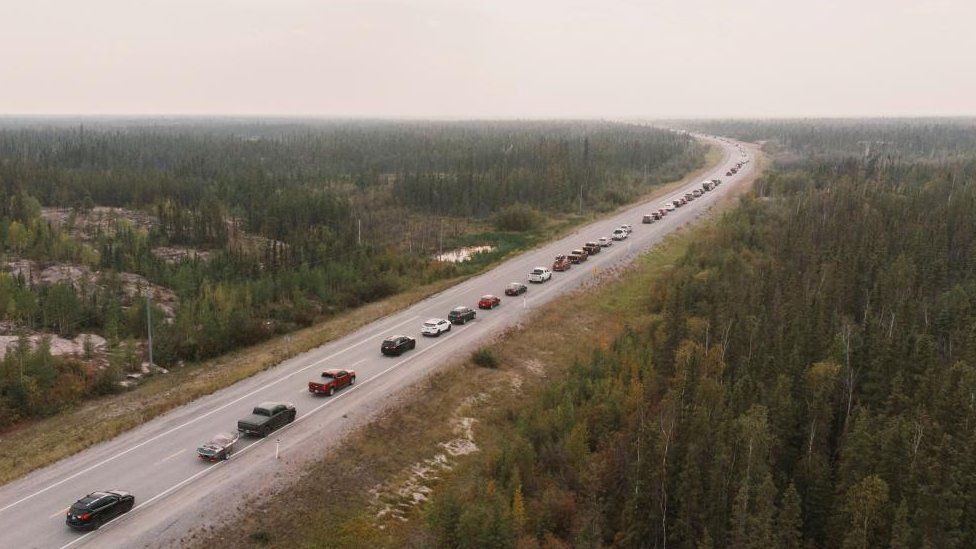Canada wildfire: Race to evacuate city as blaze approaches
One of the largest cities in Canada’s north is being evacuated amid warnings that a wildfire could reach it by the weekend.
The 20,000 residents of Yellowknife, the capital of the Northwest Territories, have been given until noon Friday (18:00 GMT) to leave.
As of Thursday morning, the fire was within 16km (10 miles) of the city.
Another fire is threatening the community of Hay River.
One evacuee told the CBC her car began melting as she and her family drove through embers while fleeing that town.
The Northwest Territories declared a state of emergency late on Tuesday as it battles nearly 240 wildfires.
Mike Westwick, the territory’s fire information officer, has said that in the absence of rain, there is a chance the blaze will reach the outskirts of Yellowknife by the weekend.
“We’re doing absolutely everything we can first and foremost to slow the growth and prevent that fire from making it to Yellowknife,” he told broadcaster CBC early on Thursday.
On Wednesday, Shane Thompson, the region’s environment minister, told reporters that the fires had “taken another turn for the worse” and represented a “real threat” to Yellowknife.
“I want to stress that the city is not in immediate danger,” he said. “[But] you put yourself and others at risk if you choose to stay.”
The premier of the Northwest Territories described the Yellowknife evacuation as “unprecedented”.
“I know we are all tired of the word but there’s no other way to describe the situation in the Northwest Territories,” Caroline Cochrane said on Wednesday.

Some residents of Yellowknife had already begun leaving earlier on Wednesday after parts of the city were put on evacuation alert, meaning they could be asked to leave at a moment’s notice.
“Watching the flights sell out and the prices go up I just kind of got to a point where we should leave,” Ashley Maclellan, who fled with her baby south to Edmonton, told the CBC.
Hay River Mayor Kandis Jameson pleaded with anyone remaining in the town to leave immediately.
The fire moved 30km in a few hours because of strong winds earlier this week, closing the only two highways out of the town. Then it stalled about 10km away from the town.
The road out of Hay River is “treacherous”, the mayor said, and food and petrol supplies are getting low in the community.
Phone and internet services have also been down in the remote region.
Resident Lisa Mundy described how her bumper had begun to melt, her windscreen had cracked and her car had filled with smoke as she and her husband left the town with their two children on Sunday.
“You couldn’t see anything – we were driving through embers,” she said.
“[My six-year-old son] actually said to me, ‘I don’t want to die, mommy,’ and he kept saying it so many times.”
Canada’s military has been co-ordinating airlift operations out of several communities in Northwest Territories’ South Slave Region that have been threatened by wildfires in recent days.
Airlift operations out of Yellowknife are set to begin on Thursday afternoon, the territory’s government said, with five flights scheduled to Calgary, in the neighbouring province of Alberta.
The fires have launched the largest airlift evacuation effort in the territory’s history.
The communities of Fort Smith, K’atl’odeeche First Nation, Hay River, Enterprise and Jean Marie River are all also under evacuation orders.

Enterprise, home to 120 people, is “90% gone” after a wildfire swept through this week, the community’s mayor told the CBC on Tuesday.
Canada is having its worst wildfire season on record, with nearly 1,100 active fires burning across the country as of Wednesday.
Experts have pointed to a warmer and drier spring than normal as the reason.
Scientists say climate change increases the risk of the hot, dry weather that is likely to fuel wildfires.



